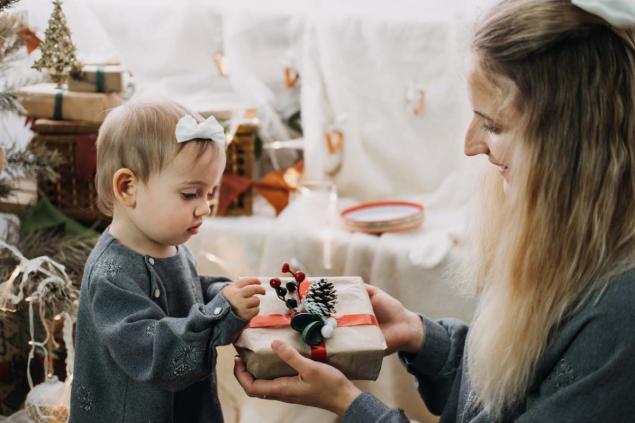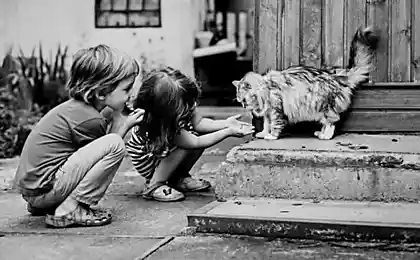172
In the old days, the best piece was given to parents, which is behind this tradition.
Caring parents stubbornly follow the unspoken rule: all the best for children. The saying covers all areas of life, parents go out of their way to make their children have a better life than they have. Is that right? After all, care gradually develops into indulging in all the whims of the child, a little god grows up in the family, who cultivates his egoism with the help of his parents.

Sacrificing your desires for the good of the child seems right for most parents. They follow the logic that says you don't have to have a baby if you can't give it everything. And this attitude to the child plays a cruel joke with parents. Adult children do not thank their parents for their help and support, they complain that mom and dad did not put enough effort into a better life. These are children who know only the word “give”, but have absolutely no idea what to give in return.

A modern parent is more likely to refuse to wear new clothes or tasty cake in order to please their child. It seems to a person that if he gives everything to his heirs, then in old age he can count on respect and help. But that's not exactly true. It’s all about respect – a quality that young parents forget to instill in their children, flooding them with material goods.

Here is a simple example from ancient times: in Russia, no one ate at the table until the head of the family took the best and largest piece of food. Then the mother ate, and then the children. Our ancestors did this not because they did not love their children, but vice versa. He who was a breadwinner in the family provided shelter and food for his wife and children must be well-fed and strong so that his family would not starve. The second obvious thing in this example is to show respect for parents. Without them, the children would be hungry.

Now mothers at all costs take care of their child until old age. They take care of the child, cook him food three times a day, wash and clean his room. Hyperprotection on the part of parents not only harms them, but also makes the child helpless, psychologists say.

Why take a loan for the best computer for a teenager or buy the newest model of a baby stroller? From an early age, the child absorbs all information like a sponge, he learns from his parents, and he is not yet able to pay attention to material goods. So don’t try to give the little man everything he wants. It is necessary to teach him the most important things that only parents, intelligent and caring parents can teach.

These things are intangible: respect for elders, hard work, honesty, independence, the ability to empathize. Growing up, a person does not remember what gifts his parents gave him. He remembers walking with his father in the park, how his mother taught him how to bake pancakes, how his grandmother told about his grandfather’s exploits. Attention, care, love They have nothing to do with the material situation. What do you think?

Sacrificing your desires for the good of the child seems right for most parents. They follow the logic that says you don't have to have a baby if you can't give it everything. And this attitude to the child plays a cruel joke with parents. Adult children do not thank their parents for their help and support, they complain that mom and dad did not put enough effort into a better life. These are children who know only the word “give”, but have absolutely no idea what to give in return.

A modern parent is more likely to refuse to wear new clothes or tasty cake in order to please their child. It seems to a person that if he gives everything to his heirs, then in old age he can count on respect and help. But that's not exactly true. It’s all about respect – a quality that young parents forget to instill in their children, flooding them with material goods.

Here is a simple example from ancient times: in Russia, no one ate at the table until the head of the family took the best and largest piece of food. Then the mother ate, and then the children. Our ancestors did this not because they did not love their children, but vice versa. He who was a breadwinner in the family provided shelter and food for his wife and children must be well-fed and strong so that his family would not starve. The second obvious thing in this example is to show respect for parents. Without them, the children would be hungry.

Now mothers at all costs take care of their child until old age. They take care of the child, cook him food three times a day, wash and clean his room. Hyperprotection on the part of parents not only harms them, but also makes the child helpless, psychologists say.

Why take a loan for the best computer for a teenager or buy the newest model of a baby stroller? From an early age, the child absorbs all information like a sponge, he learns from his parents, and he is not yet able to pay attention to material goods. So don’t try to give the little man everything he wants. It is necessary to teach him the most important things that only parents, intelligent and caring parents can teach.

These things are intangible: respect for elders, hard work, honesty, independence, the ability to empathize. Growing up, a person does not remember what gifts his parents gave him. He remembers walking with his father in the park, how his mother taught him how to bake pancakes, how his grandmother told about his grandfather’s exploits. Attention, care, love They have nothing to do with the material situation. What do you think?
Ancient Japanese woman tells how to live a century without fullness and aging
A parable about how ridicule and mockery work on a person























